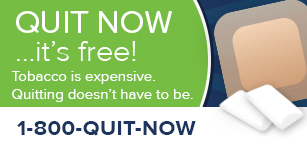Introduction
Over 7,000 South Carolinians die each year from tobacco use and, for every 1 person who dies; another 20 will suffer from at least one serious tobacco-related illness. Smoking costs the state over $2 billion in annual health care costs each year. In S.C., 6,300 people become new daily smokers each year and 240,000 are exposed to secondhand smoke in their homes.
What are the dangers of secondhand smoke?
Secondhand smoke contains up to 8,000 toxic chemicals—60 of which are known to cause cancer. The 2014 Surgeon General's Report, The Health Consequences of Smoking—50 Years of Progress reiterates earlier findings that there is no safe level of exposure to tobacco smoke—even an occasional cigarette or exposure to secondhand smoke is harmful.
- Secondhand smoke refers to the smoke exhaled into the air by smokers, as well as the smoke created by the burning of a tobacco product.
- New findings in the 2014 Surgeon General's report show a causal link between secondhand smoke exposure and the incidence of stroke among non-smokers.
- Exposure to secondhand smoke has immediate negative effects on the cardiovascular system and can cause heart disease and lung cancer.
- Non-smokers exposed to secondhand smoke are 25%-30% more likely to develop heart disease and 20%-30% more likely to develop lung cancer.
The Federal Environmental Protection Agency (EPA) has also documented that secondhand smoke causes lung cancer in adult nonsmokers and impairs the respiratory health of children. The National Academy of Sciences, the Office of the U.S. Surgeon General, the National Cancer Institute, and the U.S. Centers for Disease Control and Prevention support these findings.
Take Action
How can I help someone quit smoking?
More than 70% of adult smokers say they want to quit, but without help, fewer than 5% succeed. Tobacco cessation Quitlines increase the possibility of a successful quit attempt. Smokers who receive Quitline services are 60% more likely to quit successfully than those trying to quit on their own. Tobacco users who receive medications and Quitline phone counseling have a 30% greater chance of quitting compared to using medications alone.
Launched in 2006, the S.C. Tobacco Quitline offers free cessation services to all South Carolinians, 7 days a week from 8 a.m. until 3 a.m. By calling 1-800-QUIT-NOW (800-784-8669), tobacco users are connected with a trained tobacco Quit Coach who offers individualized help—identifying triggers, dealing with cravings, and setting a quit date. The calls are personalized and conversational. Once enrolled, participants receive personal behavioral counseling, a Quit Kit of support materials, access to online support through Web Coach® and a variety of social media and mobile apps, such as Text2Quit®, and referral back to community resources - regardless of their geographic location, race/ethnicity, economic status, or health insurance status. Many enrolled tobacco users are eligible for free Nicotine Replacement Therapy and should speak with their Quit Coach about availability.
Related Resources
